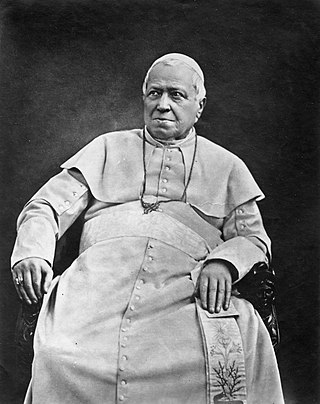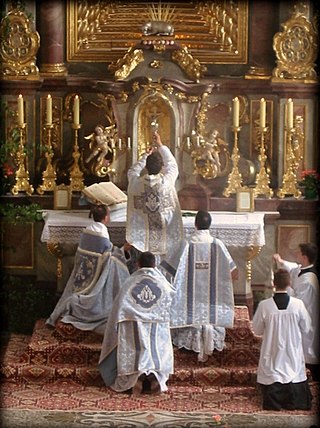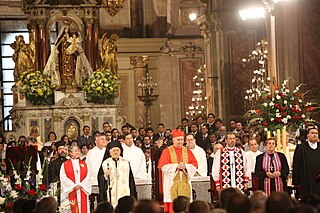
Pope John XXIII was head of the Catholic Church and sovereign of the Vatican City State from 28 October 1958 until his death in June 1963.

The Roman Missal is the title of several missals used in the celebration of the Roman Rite. Along with other liturgical books of the Roman Rite, the Roman Missal contains the texts and rubrics for the celebration of the most common liturgy and Mass of the Catholic Church.

Pope Pius IX was head of the Catholic Church from 1846 to 1878. His reign of nearly 32 years is the longest of any pope in history. He was notable for convoking the First Vatican Council in 1868 and for permanently losing control of the Papal States in 1870 to the Kingdom of Italy. Thereafter, he refused to leave Vatican City, declaring himself a "prisoner in the Vatican".

Pope Pius VII was head of the Catholic Church from 14 March 1800 to his death in August 1823. He ruled the Papal States from June 1800 to 17 May 1809 and again from 1814 to his death. Chiaramonti was also a monk of the Order of Saint Benedict in addition to being a well-known theologian and bishop.

The Tridentine Mass, also known as the Traditional Latin Mass or the Traditional Rite, is the liturgy in the Roman Missal of the Catholic Church codified in 1570 and published thereafter with amendments up to 1962. Celebrated almost exclusively in Ecclesiastical Latin, it was the most widely used Eucharistic liturgy in the world from its issuance in 1570 until the introduction of the Mass of Paul VI.

A papal coronation is the formal ceremony of the placing of the papal tiara on a newly elected pope. The first recorded papal coronation was of Pope Nicholas I in 858. The most recent was the 1963 coronation of Paul VI, who soon afterwards abandoned the practice of wearing the tiara. To date, none of his successors have used the tiara, and their papal inauguration celebrations have included no coronation ceremony, although any future pope may elect to restore the use of the tiara at any point during his pontificate.

Traditionalist Catholicism is a movement that emphasizes beliefs, practices, customs, traditions, liturgical forms, devotions and presentations of teaching associated with the Catholic Church before the Second Vatican Council (1962–1965). Traditionalist Catholics particularly emphasize the Tridentine Mass, the Roman Rite liturgy largely replaced in general use by the post-Second Vatican Council Mass of Paul VI.
A jubilee is a special year of remission of sins, debts and universal pardon. In Leviticus, a jubilee year is mentioned to occur every 50th year; during which slaves and prisoners would be freed, debts would be forgiven and the mercies of God would be particularly manifest.
The Latin phrase extra Ecclesiam nulla salus is a phrase referring to a Christian doctrine about who is to receive salvation.

Open communion is the practice of some Protestant Churches of allowing members and non-members to receive the Eucharist. Many but not all churches that practice open communion require that the person receiving communion be a baptized Christian, and other requirements may apply as well. In Methodism, open communion is referred to as the open table, meaning that all may approach the Communion table.

The Catholic Church, also known as the Roman Catholic Church, is the largest Christian church, with 1.28 to 1.39 billion baptized Catholics worldwide as of 2024. It is among the world's oldest and largest international institutions and has played a prominent role in the history and development of Western civilization. The church consists of 24 sui iuris churches, including the Latin Church and 23 Eastern Catholic Churches, which comprise almost 3,500 dioceses and eparchies around the world. The pope, who is the bishop of Rome, is the chief pastor of the church. The Diocese of Rome, known as the Holy See, is the central governing authority of the church. The administrative body of the Holy See, the Roman Curia, has its principal offices in Vatican City, which is a small, independent city-state and enclave within the city of Rome, of which the pope is head of state.

On 2 April 2005, Pope John Paul II died at the age of 84. His funeral was held on 8 April, followed by the novendiales devotional in which the Catholic Church observed nine days of mourning.
The history of the Catholic Church is integral to the history of Christianity as a whole. It is also, according to church historian Mark A. Noll, the "world's oldest continuously functioning international institution." This article covers a period of just under two thousand years.

The Roman Rite is the most common ritual family for performing the ecclesiastical services of the Latin Church, the largest of the sui iuris particular churches that comprise the Catholic Church. The Roman Rite governs rites such as the Roman Mass and the Liturgy of the Hours as well as the manner in which sacraments and blessings are performed.

The Catholic Church has engaged in the modern ecumenical movement especially since the Second Vatican Council (1962–1965) and the issuing of the decree Unitatis redintegratio and the declaration Dignitatis humanae. It was at the Council that the Pontifical Council for Promoting Christian Unity was created. Those outside of the Catholic Church were categorised as heretics or schismatics, but in many contexts today, to avoid offence, the euphemism "separated brethren" is used.

Eucharist is the name that Catholic Christians give to the sacrament by which, according to their belief, the body and blood of Christ are present in the bread and wine consecrated during the Catholic eucharistic liturgy, generally known as the Mass. The definition of the Eucharist in the 1983 Code of Canon Law as the sacrament where Christ himself “is contained, offered, and received” points to the three aspects of the Eucharist according to Catholic theology: the real presence of Christ in the Eucharist, Holy Communion, and the holy sacrifice of the Mass.

The Mass is the central liturgical service of the Eucharist in the Catholic Church, in which bread and wine are consecrated and become the body and blood of Christ. As defined by the Church at the Council of Trent, in the Mass "the same Christ who offered himself once in a bloody manner on the altar of the cross, is present and offered in an unbloody manner". The Church describes the Mass as the "source and summit of the Christian life", and teaches that the Mass is a sacrifice, in which the sacramental bread and wine, through consecration by an ordained priest, become the sacrificial body, blood, soul, and divinity of Christ as the sacrifice on Calvary made truly present once again on the altar. The Catholic Church permits only baptised members in the state of grace to receive Christ in the Eucharist.

The Mariology of the popes is the theological study of the influence that the popes have had on the development, formulation and transformation of the Roman Catholic Church's doctrines and devotions relating to the Blessed Virgin Mary.

The Memorial of the Holy Guardian Angels is a memorial of the Catholic Church officially observed on 2 October. In some places, the feast is observed on the first Sunday in September with the permission of the Congregation for Divine Worship. Catholics set up altars in honor of guardian angels as early as the 4th Century, and local celebrations of a feast in honor of guardian angels go back to the 11th Century. The feast is also observed by some Evangelical Catholic parishes within the Lutheran Churches, as well as by Anglo-Catholics within the Anglican Communion and most churches of the Continuing Anglican movement.















